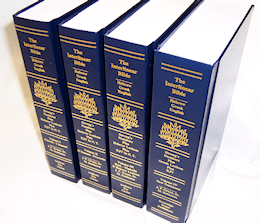Textus Receptus Bibles
Jay P. Green's Literal Translation 1993
| 24:1 | When a man has taken a wife and married her, and it happens that she finds no favor in his eyes because he has found a thing of uncleanness in her, and he writes her a bill of divorce and puts it in her hand, and sends her out of his house; |
| 24:2 | and if she leaves his house and goes and becomes another man's wife , |
| 24:3 | and the latter husband hates her, and writes her a bill of divorce, and puts it in her hand, and sends her out of his house or if the latter husband who took her to be his wife dies; |
| 24:4 | her former husband who sent her away is not to take her again to be his wife, after she is defiled. For it is a hateful thing before Jehovah, and you shall not cause the land to sin which Jehovah your God is giving to you as an inheritance. |
| 24:5 | When a man has taken a new wife, he shall not go out to war, and he shall not be given any duty. He shall be free at his own house for one year, and shall gladden his wife whom he has taken. |
| 24:6 | No one shall take in pledge the lower and upper millstone, for he is taking a man's life to pledge. |
| 24:7 | If a man is found stealing a person of his brothers of the sons of Israel, and has dealt with him as a slave, and sold him, then that thief shall die. And you shall put away the evil from among you. |
| 24:8 | Be on guard in the plague of leprosy, that you watch closely and do according to all that the Levitical priests shall teach you. As I commanded them, so you shall be careful to do. |
| 24:9 | Remember that which Jehovah your God did to Miriam in the way, as you came out of Egypt. |
| 24:10 | When you lend your neighbor any kind of loan, you shall not go into his house to get his pledge. |
| 24:11 | You shall stand outside, and the man to whom you lend shall bring the security outside to you. |
| 24:12 | And if the man is poor, you shall not sleep with his pledge. |
| 24:13 | You shall certainly give back to him the pledge at sundown; and he shall lie down in his own clothing, and shall bless you. And it shall be righteousness to you before Jehovah your God. |
| 24:14 | You shall not oppress a poor and needy hired servant, of your brothers or of your aliens who are in your land, within your gates. |
| 24:15 | In the same day you shall give him his hire; do not let the sun go down on it. For he is poor, and has lifted up his heart on it; that he not cry against you to Jehovah, and it be sin against you. |
| 24:16 | The fathers shall not be put to death for sons, and sons are not to be put to death for fathers; they each shall be put to death for his own sin. |
| 24:17 | You shall not pervert judgment of an alien, or of an orphan; and you shall not take a widow's garment as pledge. |
| 24:18 | But you shall remember that you were a slave in Egypt, and Jehovah your God redeemed you from there. For that reason I command you to do this thing. |
| 24:19 | When you cut down your harvest in your field, and have forgotten a sheaf in the field, you shall not turn back to take it. It shall be for the alien, for the orphan. and for the widow; so that Jehovah your God shall bless you in all the work of your hand. |
| 24:20 | When you beat your olive tree, you shall not search the branch behind you. It shall be for the alien, for the orphan, and for the widow. |
| 24:21 | When you gather the grapes of your vineyard, you shall not glean it afterward. It shall be for the alien, for the orphan, and for the widow. |
| 24:22 | And you shall remember that you were a slave in the land of Egypt. On account of this I am commanding you to do this thing. |

Green's Literal Translation 1993
Green's Literal Translation (Literal Translation of the Holy Bible - LITV), is a translation of the Bible by Jay P. Green, Sr., first published in 1985. The LITV takes a literal, formal equivalence approach to translation. The Masoretic Text is used as the Hebrew basis for the Old Testament, and the Textus Receptus is used as the Greek basis for the New Testament.
Green's Literal Translation (LITV). Copyright 1993
by Jay P. Green Sr.
All rights reserved. Jay P. Green Sr.,
Lafayette, IN. U.S.A. 47903.